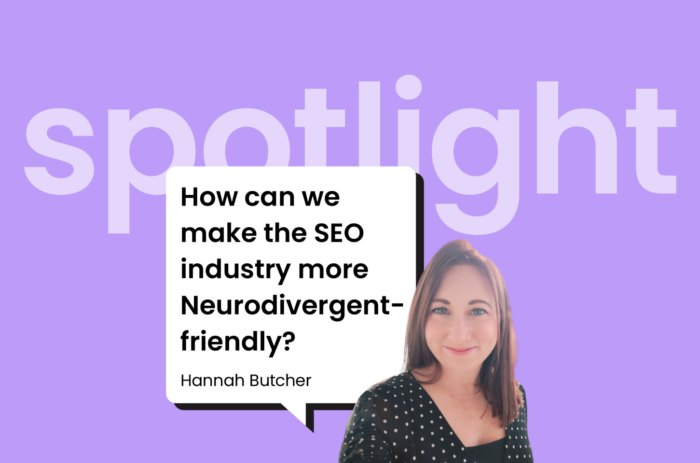In 2021, I accidentally started talking about neurodiversity in SEO. I had no plan; I just happened to be on my own diagnosis journey for autism and ADHD and realised there wasn’t a lot of information available for others in the industry.
I ended up recording a presentation used at two BrightonSEO events, and I haven’t stopped talking about it since. Three years later, there’s still work to be done. That’s why BrightLocal has supported me in writing this article all about how we can make the SEO industry more neurodivergent-friendly.
Disclaimer: In the sections below, you’ll find some of my ideas about what more we can do, but it’s important to remember that many more areas of improvement exist outside of my own lived experiences. Speak to your neurodivergent peers, managers, and direct reports; you’ll learn much more. Every neurodivergent SEO will have their own needs and preferences.
What actually is neurodivergence?
You may already know about neurodivergence or heard the phrase “neurodiversity”. Very Well Mind explains that “neurodiversity is the concept that there are a variety of ways that people’s brains process information, function, and present behaviorally.”
Within that, you have “neurotypical,” which refers to “someone who has the brain functions, behaviors, and processing considered standard or typical.” And then you have “neurodivergent,” which is the term for “people whose brains function differently in one or more ways than is considered standard or typical.”
There’s a growing group of types of neurodivergence, but some that you may be familiar with include:
- Autism
- ADHD
- Dyslexia
- Dyspraxia
- Dyscalculia
- Tourette’s
- Synesthesia
- Down syndrome
- Epilepsy
- Plus, chronic mental health illnesses such as bipolar disorder, OCD, BPD, anxiety, and depression.
This isn’t an exclusive list; the umbrella of neurodivergence is wide. However, I recommend reading about any of the forms of neurodivergence in this list that you aren’t familiar with so you can start understanding more of your peers. I’m still learning something new every day.
Neurodivergence in the SEO Industry
Back to SEO, more specifically. There are probably more neurodivergent SEOs in your network than you’re aware of! There’s now a whole community growing thanks to the founders of Neurodivergents in SEO, who have a Slack group and are starting to have a presence at industry conferences.
Let’s move on and look at different areas which could become more neurodivergent-friendly.
Working Arrangements for Neurodivergent People
In the past, I’ve found office spaces to bring on sensory overload or just have too many distractions. As a freelancer, I can now work from home, in a coworking space, or in a coffee shop, depending on how I’m feeling on any given day. This isn’t possible for everyone with a permanent role, so a bit of flexibility can make a world of difference for some neurodivergent folks.
Flexibility may come in the form of hybrid working (some days in the office and some at home) or in working hours. I’m an early bird and like to get going in the morning, but over half of people with ADHD experience sleeping problems, so others would benefit from a later start to aid productivity.
In the office itself, providing adjustable lighting, soundproofing, ergonomic furniture, and designated quiet areas where employees can retreat for focused work or sensory breaks could be welcome additions. Some individuals also need noise-canceling headphones or earplugs, so take a look at current office policies and make sure there isn’t a blanket ban on using these in communal spaces.
Freelancing as a Neurodivergent Individual
Of course, not every professional in the industry works in a permanent role within an agency or in-house; we have a great number of freelancers and consultants, too. Having only gone freelance myself in early 2024 after 13 years agency-side, I asked one of my neurodivergent peers to give me their more informed insights as a longer-term freelancer in the industry. Meet Lois Neville, a freelance SEO copywriter:
Neurodivergence and Job Interview Needs
In the section above, Lois mentioned disclosure. I’m not here to tell anyone whether they should disclose their neurodivergence to an existing or prospective employer, as that’s a personal choice. But what I can help with is if someone has chosen to disclose this information before a job interview.
Regardless of neurodivergence, there’s one thing you can do for all candidates: offer clear instructions about the interview process, including what to expect, how to prepare, and any accommodations available upon request.
If you’re able to offer flexibility, let candidates choose from a range of interview formats, such as in-person, virtual, or asynchronous options, to accommodate individual preferences and needs. You should also provide candidates with detailed information about the interview format, structure, and questions in advance.
During the interview, think about offering extended time, breaks, or alternative communication methods. If you’re setting an interview task, send this in the candidate’s preferred format and let them send it back in the same way. For example, a dyslexic candidate may feel more comfortable sending a Loom recording than a written answer.
Networking Events and Conferences Need Considerations for Neurodivergent Folk
On LinkedIn, I’ve shared a whole post just about being autistic at conferences, award ceremonies, and events. Many of the same things apply to office spaces, particularly regarding the environment and sensory overload.
Some events already have quiet rooms, which is a great first step. But more could be done to offer more accessible routes that don’t have toilet queues, coffee/beer hurdles, or exhibition stands in the way.
Networking can be hard for many people, so innovation in this area would benefit a large number of attendees, whether neurodivergent or introverted. Having alternative forms of networking could cater to more people, whether it’s building LEGO, playing video games, or maybe even a round of chess. Some people need to burn off energy, and others need to preserve it.
This is Just the Beginning
It’s important that we understand the benefits that neurodivergent people bring to the industry without avoiding the necessary conversations about accommodations we should be making for them too.
In the past, I’ve spoken about neurodivergent superpowers (the areas where neurodivergent individuals can have certain strengths), but I do that much less now in the fear that it over-glamorizes any form of neurodivergence and diminishes the struggles that individuals may face.
But theoretically, neurodivergence should work well in SEO; we have roles that span analytical to creative, roles that are client-facing, and others that are not. Some people are managers, and others are consultants. Some are great at sharing stories on stage, others by podcast, text, or just through their day-to-day work.
To turn that theory into reality means staying curious and informed and then making changes to nurture this and the next generation of neurodivergent talent in the industry. This article can be your springboard, but the next move is up to you.



